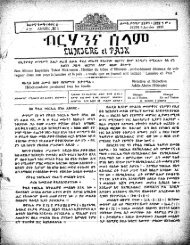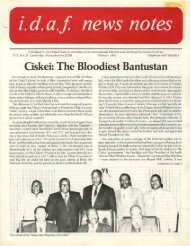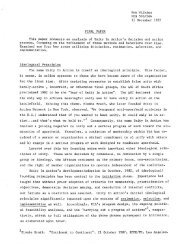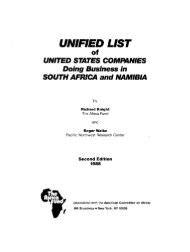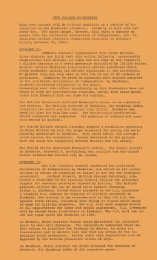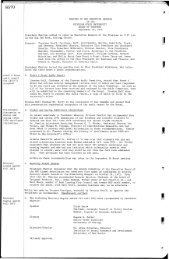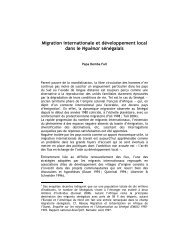DIVESTMENT PRESSURE ESCALATES - KORA
DIVESTMENT PRESSURE ESCALATES - KORA
DIVESTMENT PRESSURE ESCALATES - KORA
Create successful ePaper yourself
Turn your PDF publications into a flip-book with our unique Google optimized e-Paper software.
AMERICAN CO!v\MITTEE ON AFRICA<br />
act/on news<br />
SPRING 1985<br />
Number 19<br />
198 [)roadw ay • New York, NY 100J8 • (212) 962-1210<br />
<strong>DIVESTMENT</strong> <strong>PRESSURE</strong> <strong>ESCALATES</strong><br />
by Dumisani Kumalo<br />
For the past six months, South<br />
Africa has been torn by bloody protests<br />
as black people continue to rise up<br />
against the apartheid regime. And as<br />
these protesters burn government<br />
buildings and other apartheid installations,<br />
executives of US companies doing<br />
business in South Africa have helplessly<br />
watched one of their favorite arguments<br />
against divestment-namely, that their<br />
presence in South Africa helps change<br />
apartheid -also go up in smoke. This<br />
could not have happened at a worse time<br />
for the companies, and especially for the<br />
South African regime.<br />
There has been a steady increase<br />
over the past five years in legislation introduced<br />
in states and cities across the<br />
US aimed at ending the investment of<br />
public funds in companies supporting<br />
apartheid. Since the beginning of 1985,<br />
the pace has accelerated, with a record<br />
thirty bills introduced at the state level,<br />
and many more in city councils. Even<br />
the US Congress, which has been cool to<br />
the idea of divestment, is presently faced<br />
with more than ten different bills aimed<br />
at economic sanctions against apartheid.<br />
SA Alerts Business<br />
The South African government,<br />
which used to pretend the divestment<br />
movement would have no impact, while<br />
still enforcing the Internal Security Act<br />
that makes it a "crime of treason" to<br />
speak out for divestment, is now placing<br />
the South African business community<br />
on the alert. The Rand Daily Mail, a<br />
South African newspaper, reported<br />
recently that the government sent a<br />
senior foreign affairs official around the<br />
country to meet with businessmen and<br />
prepare them for the "shock of further<br />
American disinvestment, which it<br />
regards as highly likely." The Deputy<br />
Director General of the Ministry of<br />
Foreign Affairs, Mr. Carl von Hirschberg,<br />
said: "It's quite likely that certain<br />
disinvestment measures proposed in the<br />
US Congress before its adjournment in<br />
November will come into effect in the<br />
next session."<br />
These bills follow the successful<br />
passage of divestment legislation in five<br />
states-Connecticut, Maryland, Massa-<br />
Photos by Joshua Nessen<br />
chusetts, Michigan and Nebraskawhere<br />
laws prohibiting the investment of<br />
state funds in banks and companies supporting<br />
apartheid are now being enforced.<br />
By the end of 1984, state and<br />
municipal actions across the US had<br />
continued on page 5<br />
Anti-Apartheid Action at the White House<br />
Executive Director Jennifer Davis was one of 320 people arrested April 22 in<br />
a nonviolent blockade of the White House, the last of four days of action for<br />
Peace, Jobs and Justice. As one of the initiators of the April actions and a<br />
member of the steering committee, ACOA successfully pressed the coalition to<br />
include opposition to apartheid as one of the four main themes of the action,<br />
and was instrumental in bringing in other anti-apartheid organizations. The action<br />
included rallies in Washington, DC, Los Angeles, Seattle and San Francisco<br />
that drew over 150·,000 people. Projects Director Durnisani Kumalo was a<br />
keynote speaker at the Washington demonstration.<br />
- Related stories on page Z -
Students Build Blockades<br />
THOUSANDS DEMONSTRATE IN TWO WEEKS OF ACTION<br />
As resistance in the black townships<br />
of South Africa mounted after police<br />
gunned down at least nineteen peaceful<br />
marchers on the anniversary of the<br />
Sharpeville massacre March 21, a series<br />
of marches, rallies and demonstrations<br />
took place in cities and on campuses<br />
across the US. The protests were part of<br />
the annual Two Weeks of Anti-Apartheid<br />
Action, March 21-April6, initiated<br />
by ACOA.<br />
Several of the demonstrations targeted<br />
the headquarters of some of the<br />
largest investors in South Africa. A<br />
march in Detroit, supported by several<br />
UAW locals, culminated in a rally outside<br />
General Motors headquarters; at<br />
least 1,000 people in New York marched<br />
from the South African consulate, past<br />
the offices of Citicorp, Fluor Corp., and<br />
Deak-Perera (the largest Krugerrand<br />
distributor) to a rally in front of Mobil<br />
Oil headquarters; and in Washington,<br />
DC, an estimated 4,000 people, including<br />
students from six area colleges,<br />
rallied outside the South African embassy.<br />
National Divestment Day<br />
On college and university campuses<br />
around the country, thousands of<br />
students demonstrated on April 4,<br />
designated by ACOA as a national day<br />
for divestment action. The day has particular<br />
significance because it com-<br />
memorates the assassination of Rev.<br />
Martin Luther King, Jr., who in 1962<br />
issued a joint appeal with African National<br />
Congress President Albert<br />
Luthuli, calling for no foreign investment<br />
in South Africa.<br />
Perhaps the most dramatic events<br />
occurred at Columbia University in New<br />
York, where on March 25 seven students<br />
began a hunger strike for divestment,<br />
leading up to a rally ten days later, and<br />
sparking the involvement of several hundred<br />
more students in a human blockade<br />
on the steps of a main campus building.<br />
Students chained the front doors of<br />
Hamilton Hall (which they renamed<br />
Mandela Hall) and camped out on the<br />
steps for over three weeks, demanding<br />
that the university divest itself of the<br />
A COA 's Student Coordinator Joshua<br />
Nessen at Columbia University where<br />
students blockaded a building they renamed<br />
Mandela Hall.<br />
2<br />
$32.5 million in stocks it holds in companies<br />
doing business in South Africa.<br />
ACOA board member William<br />
Booth addressed an April 4th rally at<br />
Columbia. Other people who carne to<br />
give the blockaders their support during<br />
the three-week action included Rev.<br />
Jesse Jackson, South African poet Dennis<br />
Brutus, and Cleveland Robinson of<br />
District 65, UAW.<br />
Thousands Arrested<br />
The Columbia blockade helped<br />
spark similar actions at other schools including<br />
Rutgers University in New<br />
Jersey, the University of California at<br />
Berkeley, Los Angeles, and Santa Cruz,<br />
Tufts University in Massachusetts, and<br />
Cornell University in New York. Protesters<br />
have been arrested at several campuses<br />
including over 1 ,000 at Cornell.<br />
These actions, in turn, led to<br />
demonstrations and other actions at<br />
more than 100 campuses on April 24th,<br />
which the students declared National<br />
Anti-Apartheid Day. Students at the<br />
University of Wisconsin at Madison occupied<br />
the State Capitol rotunda,<br />
gathering support from around the<br />
state, with 200-400 staying each night,<br />
demanding passage of a divestment bill<br />
introduced by Rep. Marcia Coggs.<br />
ACOA's Joshua Nessen helped coordinate<br />
the nationwide actions, and is<br />
working closely with the networks planning<br />
summer and fall organizing.
ence on Labor and South Africa. " From left to<br />
on of Textile Workers, Emma Mashinini of the<br />
rs Union, and Edward Mogane of the Building,<br />
Construction and Allied Workers Union.<br />
TS SOUTH AFRICAN UNIONISTS<br />
Council of Unions of South Africa addressed<br />
the two-day conference, which<br />
was held in New York City at the headquarters<br />
of District Council 37,<br />
AFSCME.<br />
ACOA board member William<br />
Booth addressed the opening session<br />
and Executive Director Jennifer Davis<br />
and Projects Director Dumisani Kumalo<br />
were panelists at a conference workshop<br />
on divestment.<br />
Emma Mashinini, in the featured<br />
address at a rally preceding the conference,<br />
expressed her gratitude to<br />
Americans for their actions against<br />
apartheid:<br />
"Thank you comrades. You really<br />
have touched my heart. I really didn't<br />
expect such loud applause from people<br />
who are doing so much for us in South<br />
Africa. We, the workers of South Africa<br />
have come all the way to say to you that<br />
we appreciate every move, everything<br />
that you do in solidarity with the struggling<br />
workers in South Africa. So much<br />
has been demonstrated in the short time<br />
that I have been here in the USA. It is so<br />
good to learn about the number of committees<br />
that are going on in the United<br />
States that are really striving to see that<br />
apartheid comes to an end. We appreciate<br />
all this, comrades.<br />
"We want to tell you about the<br />
workers who are working under the<br />
apartheid system. How it affects us,<br />
how we have to pay for it even though<br />
we were not in the decision-making of all·<br />
those laws that oppress us so much.<br />
South Africa is a deeply divided society.<br />
Divisions in race, culture, language, colour,<br />
nationality and socio-economic<br />
development give rise to intense inter-<br />
ACOA Executive Director Jennifer Davis and Projects Director Dumisani Kumalo at a<br />
conference workshop on divestment. From left to right: Kumalo, Nelson Nthombeni of the<br />
National Union of Textile Workers, New York City Councilmember Ruth Messinger, Davis,<br />
and Bill Henning, vice president of Local 1180, Communication Workers of America.<br />
group rivalry within a single political<br />
unit. Racism is a form of collective and<br />
structural sin, for it robs human beings<br />
of their dignity and their rights, and it is<br />
a means of oppression and exploitation.<br />
It denies even the significance of God's<br />
intentions for human relations. Apartheid<br />
is a destructiveforcefor it generates<br />
hostility and untold suffering.<br />
"The trade union movement is<br />
growing by leaps and bounds and we are<br />
going to conquer. We call on you to<br />
show us your solidarity, even more than<br />
you have done. Freedom we are going to<br />
get, comrades. Bishop Tutu has our support<br />
in the things he has been saying for<br />
the number of months and weeks that he<br />
has been here in the United States.<br />
"Comrades, we say continue with<br />
the good work that you are doing.<br />
Freedom and justice must prevail in<br />
South Africa, and when we do take over<br />
we shall remember you."<br />
ACOJS. WELCOMES NEW BOARD MEMBERS<br />
Tilden J. LeMelle Hudson Rev. M. William Howard<br />
At its March meeting, the ACOA Executive Board elected three new officers<br />
and two new board members. Treasurer Tilden J. LeMelle, Provost at Hunter<br />
College, was elected President, succeeding William H . Booth, who will continue<br />
as a member of the board. Booth was praised by the board for his tireless enthusiasm<br />
in the post he has held for twelve years. Elected Vice President was new<br />
board member Rev. M. William Howard, director of the Reformed Church's<br />
Black Council and former president of the National Council of Churches. Gail<br />
Hovey was elected Treasurer; she is executive editor of Christianity and Crisis<br />
and former ACOA research director. Also added to the Executive Board was<br />
John Hudson, president of the Amalgamated Clothing and Textile Workers<br />
Union's Joint Headwear Board and a coordinator of the New York Area Labor<br />
Committee Against Apartheid.<br />
The board expressed its deep appreciation for his years of support and best<br />
wishes to Rev. Edward May, who resigned from the board upon his retirement from<br />
Lutheran World Ministries.<br />
4
NEw PUBLICATIONS<br />
The following are new publications available<br />
from ACOA. Prices are listed. Please<br />
indicate the number of copies desired.<br />
_ ECONOMIC ACTION AGAINST<br />
APARTHEID: AN OVERVIEW OF THE<br />
<strong>DIVESTMENT</strong> CAMPAIGN AND<br />
FINANCIAL IMPLICATIONS FOR IN<br />
STITUTIONAL INVESTORS by Brooke<br />
Baldwin & Theodore Brown, The Africa<br />
Fund 1985, 47 pp. (typescript) Covers the<br />
divestment movement, including US corporate<br />
and South African government<br />
response, and compares return rates and risk<br />
factors of investment grade securities of companies<br />
with and without investments in South<br />
Africa. $3 .00.<br />
_ 1984IN SOUTH AFRICA: THE ILLUSION<br />
OF REFORM, THE REALITY OF RESIS<br />
TANCE by Jennifer Davis, Executive Director<br />
of ACOA, The Africa Fund 1985, 6 pp.<br />
An analysis of the growing resistance to<br />
apartheid. 35¢. Over twenty, 20¢.<br />
_ BUYING A PIECE OF APARTHEID: THE<br />
KRUGERRAND CONNECTION by David<br />
Brooks, ACOA 1985, 4 pp. The Krugerrand<br />
gold coin, which makes up almost '!. of<br />
South Africa's exports to the US, is an important<br />
target for anti-apartheid activists. 30¢.<br />
Over twenty, 15¢ each.<br />
_PUBLIC INVESTMENT AND SOUTH<br />
AFRICA NEWSLETTER, (latest update:<br />
Aprill985), 14 pp. (typescript) A summary of<br />
state and municipal actions to limit economic<br />
links with firms doing business in South<br />
Africa. $2.00.<br />
_ONE STEP IN THE WRONG DIREC<br />
TION: AN ANALYSIS OF THE SULLI<br />
VAN PRINCIPLES AS A STRATEGY FOR<br />
OPPOSING APARTHEID (revised edition,<br />
January 1985) by Elizabeth Schmidt, Episcopal<br />
Church people for a Free Southern Africa,<br />
42 pp. $1.00.<br />
_ REPORT ON POLICE CONDUCT DUR<br />
ING TOWNSHIP PROTESTS-AUGUST<br />
-NOVEMBER 1984, compiled and published<br />
by Southern African Catholic Bishops' Conference,<br />
38 pp. Based on sworn affidavits,<br />
documents police brutality against residents<br />
of South Africa's black townships. $1 .00.<br />
_ THIS IS APARTHEID: A PICTORIAL IN<br />
TRODUCTION, International Defence &<br />
Aid Fund (London) 1984, 40 pp. $1.70<br />
_ THIS IS NAMIBIA: A PICTORIAL IN<br />
TRODUCTION, International Defence &<br />
Aid Fund 1984, 40 pp. $1.70.<br />
_ NAMIBIA: RECLAIMING THE PEOPLE'S<br />
HEALTH, edited by Tim Lobstein and the<br />
Namibia Support Committee Health Collective,<br />
Namibia Support Committee (London)<br />
1984, 150 pp. Background information on<br />
health conditions in Namibia. $7 .00.<br />
I enclose $ __<br />
Name<br />
Organization<br />
Address<br />
City<br />
State Zip<br />
Fill out and return with payment, to:<br />
American Committee on Africa<br />
198 Broadway, NY, NY 10038<br />
Divestment<br />
continued from page 1<br />
mandated the withdrawal of over $2<br />
billion in public funds from companies<br />
dealing with South Africa, and several<br />
hundred million dollars had already<br />
been divested. One victory in which<br />
ACOA was closely involved occurred in<br />
New York City in March. As a result of<br />
energetic labor and community support,<br />
the City Council passed strong legislation<br />
which prohibits the deposit of city<br />
funds in banks which make loans to the<br />
South African government and restricts<br />
city purchases from US corporations<br />
which sell to the South African military,<br />
police, prisons or Ministry of Cooperation<br />
and Development. Two recent<br />
additions to the divestment campaign<br />
came this spring when legislation was<br />
passed in Cincinnati, Ohio, and Miami,<br />
Florida.<br />
A summary of activities throughout<br />
the country appeared in the latest<br />
ACOA newsletter, "Public Investment<br />
and South Africa," published in February<br />
and updated in April.<br />
In an unusually revealing story, the<br />
Wall Street Journal recently reported<br />
that many US companies in South<br />
Africa were "questioning the value of<br />
staying.'' The nervousness was described<br />
as "fueled both by events in<br />
South Africa- where growing racial<br />
polarization-clouds the economic as well<br />
as the political outlook-and by pure<br />
US domestic politics."<br />
In a desperation move, Mobil Corporation,<br />
acting on behalf of the other<br />
US investors in South Africa, brought<br />
Chief Gatsha Buthelezi, leader of an<br />
apartheid government-created homeland,<br />
to visit Washington and meet with<br />
continued on page 6<br />
fuND SENDS TEXTBOOKS TO NAMIBIANS<br />
Following a shipment of over 10,000 English textbooks to Namibian<br />
refugees in Angola last December, The Africa Fund is shipping an additional<br />
5,000 textbooks, primarily mathematics texts. In response to specific requests<br />
from officials in charge of the refugees, the shipment will also include children's<br />
toys, women's underwear, children's shirts, and medical journals. The supplies<br />
were collected by Lutheran and United Methodist churches in Wisconsin, Illinois<br />
and Indiana, and by a group of medical professionals in Georgia, and will be<br />
sent in cooperation with the United Nations.<br />
H ELP FIGHT APARTHEID-SUPPORT<br />
THE AMERICAN COMMITTEE ON AFRICA<br />
The South African government and its corporate allies spend<br />
millions of dollars every year selling apartheid to Americans.<br />
The American Committee on Africa depends on contributions<br />
from ordinary people like you to counter those efforts. Your gift<br />
to ACOA will:<br />
• Help pass city and state divestment legislation to withdraw<br />
public funds from corporations whose investments in South<br />
Africa subsidize apartheid.<br />
• Mount public pressure to free South African political<br />
prisoners. Black leaders who have been released from detention<br />
have told us that only international pressure saved their<br />
lives.<br />
• Send speakers to address church, community, student and<br />
labor groups throughout the country.<br />
We need your help. Won't you mail your contribution today?<br />
I am enclosing $10_ $25_ $50_ $100_ $ __<br />
to help bring the truth about South Africa to the American people.<br />
Name Address<br />
City State Zip<br />
American Committee on Africa, 198 Broadway, NY, NY 10038<br />
5
continued from page 5<br />
President Reagan. Chief Buthelezi is<br />
alleged to be ''leader of six million<br />
Zulus," an unfounded statement since<br />
six million black people have never<br />
voted for him, or for anyone else for<br />
that matter. Nevertheless, Buthelezi's<br />
visit was supposed to douse the flames<br />
of divestment. But as the Wall Street<br />
Journal stated, although Buthelezi<br />
doesn't lack "pqwerful friends," his<br />
visit did not amount to much because<br />
"the US political storm over South<br />
Africa is gathering new power from a<br />
variety of sources unlikely to dissipate<br />
soon."<br />
Killings, Protests Continue<br />
And it did not help the companies<br />
in South Africa that the most brutal killings<br />
of black protesters by the South<br />
African police and army personnel were<br />
in the Eastern Cape, the home of such<br />
prestigious corporations as Ford and<br />
General Motors, the same companies<br />
which have been very vocal about the<br />
alleged "changes" they claimed they<br />
were bringing about in South Africa.<br />
Meanwhile, at the South African<br />
embassy in Washington and at consulates<br />
across the country, the protests<br />
and arrests continue, keeping the issue<br />
of involvement in South Africa in the<br />
media spotlight. These demonstrations<br />
in solidarity with the struggle inside the<br />
country have attracted publicity<br />
throughout the world and cast even<br />
more doubt on the role of US companies<br />
in South Africa.<br />
Local groups across the US are<br />
working hard to organize support for<br />
divestment legislation at the state level.<br />
For example, the Campaign for Illinois<br />
Divestment from South Africa<br />
(CIDSA), a broad-based coalition,<br />
organized a statewide tour to campaign<br />
for divestment. The Iowa Divestment<br />
Coalition is negotiating with legislators<br />
and the governor for passage of legislation.<br />
In Oregon, the "Portlanders<br />
Organized for a Free South Africa"<br />
mobilized more than 300 people to show<br />
up at the state legislature when hearings<br />
were held on their bill.<br />
It is difficult to estimate how many<br />
states will actually pass legislation this<br />
year, as it commonly takes at least three<br />
consecutive legislative sessions for a bill<br />
to become law and many of these states<br />
are debating divestment for the first<br />
time. But no matter what the outcome,<br />
these states will never be the same-and<br />
nor will South Africa and its corporate<br />
supporters.<br />
You CAN MAKE A DIFFERENCE<br />
The unprecedented level of protest in South Africa has sparked a dramatic increase<br />
in anti-apartheid activities in this country, an increase that could mean great<br />
advances for the struggle for justice in South Africa. It is critical that we act<br />
now-while interest is high-to make sure that this momentum is translated into<br />
meaningful victories.<br />
For the first time, there are strong bills to-combat US support for apartheid<br />
with a real chance of passage in both the House and Senate. Write to your Senator<br />
and your Representative, and ask that they support:<br />
• S 635 Co-sponsored by Senators Edward Kennedy (D-MA),<br />
William Proxmire (D-WI), Paul Sarbanes (D-MD),<br />
and Lowell Weicker (R-CT), it will ban new investment<br />
in South Africa, and prohibit bank loans and computer<br />
sales to the South African government and the import<br />
of Krugerrands. This is the Senate companion bill to:<br />
• HR 1460 Introduced by Rep. William Gray (D-PA) and cosponsored<br />
by Reps. Stephen Solarz (D-NY), Howard<br />
Wolpe (D-MI) and Walter Fauntroy (D-DC), it is identical<br />
to S 635.<br />
We also urge you to express your support for:<br />
• HR 997 Sponsored by Rep. Ron Dellums (D-CA), it would<br />
mandate immediate withdrawal of US investment<br />
from South Africa, as well as imposing a trade embargo<br />
and other sanctions.<br />
• HR 1133 and<br />
HR 1135 Sponsored by Rep . Charles Rangel (D-NY), these bills<br />
would ban nuclear-related exports to South Africa,<br />
and prohibit coal and uranium imports from South<br />
Africa and Namibia.<br />
There is plenty to do at the local level as well. Join the picket lines and sit-ins at<br />
your local South African consulate or Krugerrand dealer. It is vital that we keep up<br />
this pressure at a time when repression in South Africa is growing worse every day.<br />
Divestment legislation is being considered in cities and states around the country.<br />
The coalitions that are campaigning to get public funds out of South Africa are<br />
always looking for help. For the address and phorie number of your local coalition,<br />
call ACOA at (212) 962-1210.<br />
Remember, the time to act is now. YOU CAN MAKE A DIFFERENCE.<br />
THE AMERICAN COMMITIEE ON AFRICA<br />
Founded in 1953, the American Committee on Africa is devoted to supporting<br />
African people in their struggle for independence. ACOA projects inform and<br />
mobilize Americans to work for policies supporting African freedom.<br />
EXECUTIVE BOARD<br />
President<br />
Tilden J. LeMelle<br />
Vice President<br />
M. William Howard<br />
Elizabeth Landis<br />
Treasurer<br />
Gail Hovey<br />
Secretary<br />
Dorothy Hibbert<br />
William H . Booth<br />
Elombe Brath<br />
Robert Browne<br />
Josephine Buck-Jones<br />
Isabel Cintron<br />
Jennifer Garvey<br />
Jerry Herman<br />
John Hudson<br />
Annette Hutchins<br />
Leonard Jeffries<br />
William Johnston<br />
David Lampe!<br />
Richard Lapchick<br />
Gay McDougall<br />
Marvin Rich<br />
Jean Sindab<br />
Timothy Smith<br />
Peter Weiss<br />
NATIONAL COMMITTEE<br />
Bella Abzug<br />
James Baldwin<br />
Carlton Goodlett<br />
Donald S. Harrington<br />
John L.S. Holloman<br />
Sophia Yarnell Jacobs<br />
Edited by Richard Knight<br />
John Marcum<br />
Howard Metzenbaum<br />
Frank Montero<br />
Paul Moore, Jr.<br />
Paul O'Dwyer<br />
Frederick O'Neal<br />
Sidney Poitier<br />
Charles Rangel<br />
Cleveland Robinson<br />
Frederick A.O. Schwarz, Jr.<br />
William Scott<br />
George Shepherd<br />
Wyatt Tee Walker<br />
Executive Direcror<br />
Jennifer Davis<br />
Director Emeritus<br />
George M. Houser<br />
The American Committee on Africa 198 Broadway, New York, NY 10038 (212) 962-1210<br />
6


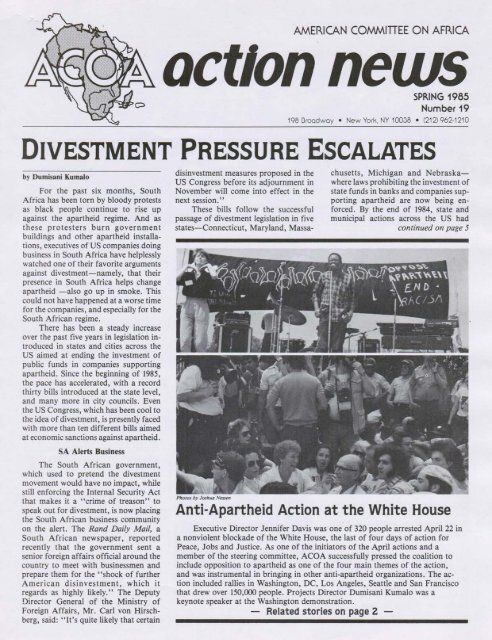
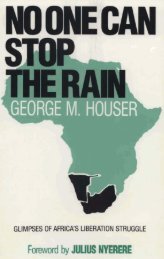
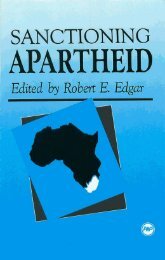

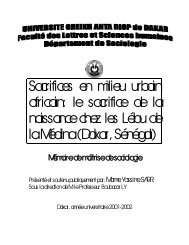
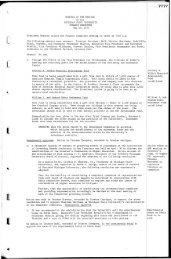
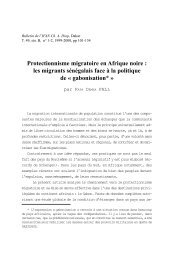
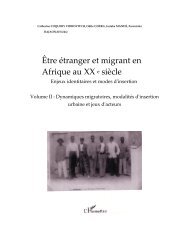
![Synthèse [6] DEFALL..INSTRAW.pdf - Matrix](https://img.yumpu.com/17880734/1/190x245/synthese-6-defallinstrawpdf-matrix.jpg?quality=85)
